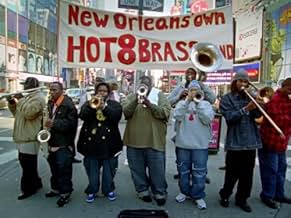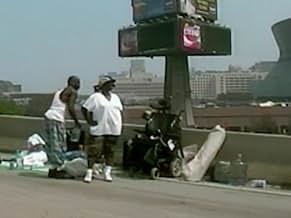Als die Deiche brachen: Ein Requiem in vier Akten
Originaltitel: When the Levees Broke: A Requiem in Four Acts
IMDb-BEWERTUNG
8,5/10
5001
IHRE BEWERTUNG
Füge eine Handlung in deiner Sprache hinzuAn examination of the U.S. government's response to Hurricane Katrina.An examination of the U.S. government's response to Hurricane Katrina.An examination of the U.S. government's response to Hurricane Katrina.
- 3 Primetime Emmys gewonnen
- 8 Gewinne & 9 Nominierungen insgesamt
Folgen durchsuchen
Empfohlene Bewertungen
A requiem is a service intended to express the emotions and beliefs of the survivors at the death of a loved one. A requiem is not an autopsy to determine the cause of death, and if Spike Lee intended a requiem, I think he has succeeded. Criticism that this film is not analytical and precise is actually a complaint that this was not an autopsy--but none was intended.
One day a documentary may be made which closely follows the chronology of the storm and the failure of the levees. A documentary may more closely focus on the devastation of the Mississippi Gulf Coast, and the equally shameful failure of government to deal with the problem there. A documentary may be made which focuses on how daily life has changed for those of us who survived. I don't think Spike Lee intended to cover all of those points. The points he did address were very well presented.
The film is outstanding at communicating the grief, suffering and frustrations of the persons shown in the film. It is a very moving expression of emotion and belief, which is the purpose of a requiem.
I don't think the lack of government response is simply and solely attributable to racism, but that may be because I am white. In the film, that opinion was frequently expressed, but I also note that there were also some opinions expressed about the levees being intentionally dynamited. I think Spike Lee undercut the impact of his major premise by including a rumor that seems similar to the myths of Bigfoot or Elvis being alive.
I think the gross government ineptitude, inertia and political games are all well-documented, and the bottom line is that those persons who were financially able to take care of themselves fared better than those who were not--it's a matter of class and wealth, and not so much a matter of race.
In yesterday's news, it was noted that Congress earlier appropriated $17 billion to build new houses in the affected areas, and that as of this date (August 22, 2006), not a single house has been built with that money in either Louisiana or Mississippi.
One day a documentary may be made which closely follows the chronology of the storm and the failure of the levees. A documentary may more closely focus on the devastation of the Mississippi Gulf Coast, and the equally shameful failure of government to deal with the problem there. A documentary may be made which focuses on how daily life has changed for those of us who survived. I don't think Spike Lee intended to cover all of those points. The points he did address were very well presented.
The film is outstanding at communicating the grief, suffering and frustrations of the persons shown in the film. It is a very moving expression of emotion and belief, which is the purpose of a requiem.
I don't think the lack of government response is simply and solely attributable to racism, but that may be because I am white. In the film, that opinion was frequently expressed, but I also note that there were also some opinions expressed about the levees being intentionally dynamited. I think Spike Lee undercut the impact of his major premise by including a rumor that seems similar to the myths of Bigfoot or Elvis being alive.
I think the gross government ineptitude, inertia and political games are all well-documented, and the bottom line is that those persons who were financially able to take care of themselves fared better than those who were not--it's a matter of class and wealth, and not so much a matter of race.
In yesterday's news, it was noted that Congress earlier appropriated $17 billion to build new houses in the affected areas, and that as of this date (August 22, 2006), not a single house has been built with that money in either Louisiana or Mississippi.
10juleyda
I saw this four-hour documentary here in the city, in an arena with about 8000 other locals (I was born and raised here and this is my first visit since Katrina). It was beautiful and had me crying from the opening montage, with the incredibly beautiful New Orleans music and Blanchard's haunting score. The point of the movie seemed to me to document the horrors and outrages that the human beings in the NOLA area had to survive (as Lee said introducing the movie, be sure you have a box of Kleenex), as well as their inimitable humor and love of life that has so far been the ONLY thing to sustain the city. In the nightmare aftermath of insurance ripoffs, government incompetence and stinginess, and frequent scorn and betrayal by other "Americans," we New Orleanians now know that we have NOBODY to rely on but ourselves and each other. And after watching this movie, I am beginning to have faith that that might actually be enough. Because we are strong, resourceful, loving, fun, proud, badass people. And to his enormous credit, Spike Lee totally gets us and has really captured the soul of the city itself: its priceless daughters and sons. All of us.
Our local rag, the Times-Picayune, published a racist and misleading review of the movie on the day it was going to be screened, basically saying it only portrayed the black experience of Katrina, whatever that means. Many white people I know didn't want to see it, based on this, which is a horrible mistake. Some of Lee's movies are provocative representations of race relations; this one IS NOT, or at least, not in that sense. Please don't fall for that--the documentary shows many different views, and of course not all "black" views are the same either, as we see, for example, in the astute critique of Condi Rice's shoe shopping jaunt. Racism is certainly an issue in discussing Katrina, but this movie doesn't endorse divisiveness at all.
I think we in the US, or at least in NOLA, ought to know better than to think that we can only relate to people who look like us. I wept for and laughed and cheered almost all the interviewees in the movie, whatever their skin color. The white women in St. Bernard and the black folks from the Lower Nine, the white guy from Uptown and the creoles from around the city. Even the rich couple from Park Island, who reminded my husband of Lovey and Thuston Howell. We are all affected by the events of Katrina, not in the same ways, but that's why this movie can help us. We can see many different Katrina stories and get a bit more sense of the scope and scale of this disaster. I grew up in Gentilly Woods so I identified most with the family in Pontchartrain Park, a few blocks north, even though I'm white and they're black. Go figure.
The bigger point is, white people need to stop freaking out about race and whether NOLA is a "chocolate city" or not, and look at the real problems: the wetlands, the federal, state, and local neglect of the levees, and the problems that preceded: education, economy, infrastructure. Those affect everyone in the city, and people outside NOLA should take heed, these are not just our problems either. This could happen to you.
Our local rag, the Times-Picayune, published a racist and misleading review of the movie on the day it was going to be screened, basically saying it only portrayed the black experience of Katrina, whatever that means. Many white people I know didn't want to see it, based on this, which is a horrible mistake. Some of Lee's movies are provocative representations of race relations; this one IS NOT, or at least, not in that sense. Please don't fall for that--the documentary shows many different views, and of course not all "black" views are the same either, as we see, for example, in the astute critique of Condi Rice's shoe shopping jaunt. Racism is certainly an issue in discussing Katrina, but this movie doesn't endorse divisiveness at all.
I think we in the US, or at least in NOLA, ought to know better than to think that we can only relate to people who look like us. I wept for and laughed and cheered almost all the interviewees in the movie, whatever their skin color. The white women in St. Bernard and the black folks from the Lower Nine, the white guy from Uptown and the creoles from around the city. Even the rich couple from Park Island, who reminded my husband of Lovey and Thuston Howell. We are all affected by the events of Katrina, not in the same ways, but that's why this movie can help us. We can see many different Katrina stories and get a bit more sense of the scope and scale of this disaster. I grew up in Gentilly Woods so I identified most with the family in Pontchartrain Park, a few blocks north, even though I'm white and they're black. Go figure.
The bigger point is, white people need to stop freaking out about race and whether NOLA is a "chocolate city" or not, and look at the real problems: the wetlands, the federal, state, and local neglect of the levees, and the problems that preceded: education, economy, infrastructure. Those affect everyone in the city, and people outside NOLA should take heed, these are not just our problems either. This could happen to you.
10dave1606
Spike Lee's film When the Levees Broke: A Requim in Four acts is a haunting look at New Orleans during and after the devastation of Katrina. But this documentary is quick to point out that the disaster was not really from nature at all, it came directly from our own government, from the army core of engineers' poor construction of the Levees to the complete breakdown of the federal government and FEMA's lack buster response. This is not easy to watch as you see just how people's lives were devastated. It is angering, saddening, and also hopeful that New Orleans will be rebuilt and that there is progress made. I liked how it does not point blame in one direction. Everyone is at fault here though some more than others. Seeing the picture of Dick Chenney fly fishing days after the disaster and Condaliza Rice buying shoes in NYC were certainly angering but also watching the governor of Lousiana refuse help from our president are standouts. However the real star of this documentary are the people of New Orleans. They talk freely and angrily about the pain that they have gone through and show that the storm didn't end last August, its still going on there to this day. It is unbelievable to watch as these people wait 4 months and longer for FEMA trailers, and when they get them to find that there is no electricity. When asked what she could do to get electricity one woman suggests a blow-job. It just shows the complete lack of support our government gave to this state and to this city. This film will move you to tears many times and is hard to take but it is necessary to watch . It features a superb score by Terrance Blanchard whose own family was devastated by Katrina as shown on film. An excellent documentary.
10khereth
By far and away the best documentary on Katrina and what happened to the people of my home, New Orleans. It captures the anger, the despair, the fear, and the humanity of our country's greatest disaster. I still cry when I see my city under water. I cry even more knowing others did not receive equal assistance because of the color of their skin. I was concerned that Spike Lee would put his spin on this tragedy, but he has done the opposite. He allows citizens from all over the city, economic and racial backgrounds to tell the real story. He gives a fair and balanced perspective on how all levels of our government failed the people of New Olreans and a good portion of the Gulf Region. I only hope that Mr. Lee comes back in a few years to film another documentary, "The City New Orleanians Re-Built".
Thank you Spike and all the people at 40 Acres and a Mule for doing what had to be done - recording the real story. I see heaps of Emmys.
Thank you Spike and all the people at 40 Acres and a Mule for doing what had to be done - recording the real story. I see heaps of Emmys.
After seeing this movie, I feel completely betrayed by the United States government and the government of Louisiana. I am from a town right outside of New Orleans (on the Northshore of Lake Pontchatrain) and my town endured much devastation and many people lost their lives. I think that this movie is a great opportunity for Spike Lee to show everyone in the United States that Hurricane Katrina still haunts the lives that it affected 1 year ago, including myself. Many people do not understand the magnitude of this storm and until you smell it, see it in person, and live it YOU WILL NEVER UNDERSTAND. To see the vice president fishing, and Rice shopping in New York just days after the devastation is very unwelcoming but sometimes I believe that at one point, there was nothing that could be done because this country was not ready for a hurricane like this and they never did expect it. But indeed, this movie can give a person a slim sense of what we endured. THe graphics were horrible and very graphic but they were a good touch as to visual understanding of the situation. Many rumors are still circulating about this storm but in my opinion, they will never really get to the end of it. The storm is over and there is no turning back time so pointing fingers is a waste of time. I believe the government needs to focus on the future and the rebuilding process of New Orleans and the other areas who were severely devastated. I give this movie 2 thumbs up because having witnessed the devastation first hand I believe Spike Lee did an extraordinary job to create a documentary that covers all aspects of this storm.
WUSSTEST DU SCHON:
- WissenswertesThe score for When the Levees Broke was re-used in the 2018 Spike Lee Joint BlackKklansman.
- VerbindungenFeatured in 50 Documentaries to See Before You Die: Episode 1 (2011)
Top-Auswahl
Melde dich zum Bewerten an und greife auf die Watchlist für personalisierte Empfehlungen zu.
Details
- Erscheinungsdatum
- Herkunftsland
- Offizieller Standort
- Sprache
- Auch bekannt als
- Cuando se rompieron los diques: Réquiem en cuatro actos
- Drehorte
- Produktionsfirmen
- Weitere beteiligte Unternehmen bei IMDbPro anzeigen
- Laufzeit51 Minuten
- Farbe
- Sound-Mix
- Seitenverhältnis
- 1.78 : 1
Zu dieser Seite beitragen
Bearbeitung vorschlagen oder fehlenden Inhalt hinzufügen

Oberste Lücke
What is the Spanish language plot outline for Als die Deiche brachen: Ein Requiem in vier Akten (2006)?
Antwort






















